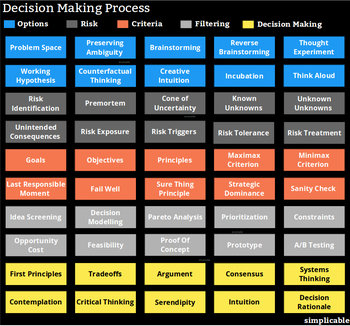|
| |
A point of no return is the point at which a decision or action becomes irreversible. This is a common consideration in risk management, decision making and strategy planning.AviationIn aviation, a point of no return is the moment that an aircraft burns enough fuel that it is no longer possible to return to its departure point.
Burning Your BridgesIn some cases, a point of no return is intentionally crossed in order to increase commitment to a strategy. The analogy "burning your bridges" stems from historical battles in which military commanders intentionally destroyed their means of retreat such as bridges or boats in order to motivate their troops.Sunken Costs FallacySunken costs is a common error of logic by which people continue with a failing strategy because they have invested in it. Points of no return are relatively rare. It is usually possible and preferable to end a failing strategy as quickly as possible.
Existential RiskPoints of no return are often difficult to understand in complex systems. As such, they may represent a particularly threatening and difficult to identify category of risk. For example, an environmental problem may reach a point of no return that results in widespread destruction of the planet's ecosystem.|
Type | | Definition | The point at which a decision, action or process becomes irreversible. | Related Concepts | |
Business Strategy
This is the complete list of articles we have written about business strategy.
If you enjoyed this page, please consider bookmarking Simplicable.
An extensive list of business strategies.
A reasonably comprehensive guide to strategy.
The difference between a baseline and a benchmark.
A definition of strategy vs tactics with two examples.
A few sources of competitive advantage for businesses.
A list of macro environment components.
The difference between competitive advantage and distinctive capability.
An overview of a common business strategy.
A definition of restructuring with examples.
A list of decision making techniques.
The observation that groups may make collective decisions that are viewed as wrong or irrational by each individual member of the group.
A complete guide to the decision making process.
The difference between rational thought and logic.
The common types of uncertainty in decision making and strategy.
A definition of information costs with examples.
A definition of reverse brainstorming with examples.
The definition of decision fatigue with examples.
Taking a position that you do not necessarily agree with for the purposes of argument.
The definition of paradox of choice with examples.
TrendingThe most popular articles on Simplicable in the past day.
Recent posts or updates on Simplicable.
Site Map
© 2010-2023 Simplicable. All Rights Reserved. Reproduction of materials found on this site, in any form, without explicit permission is prohibited.
View credits & copyrights or citation information for this page.
|






























